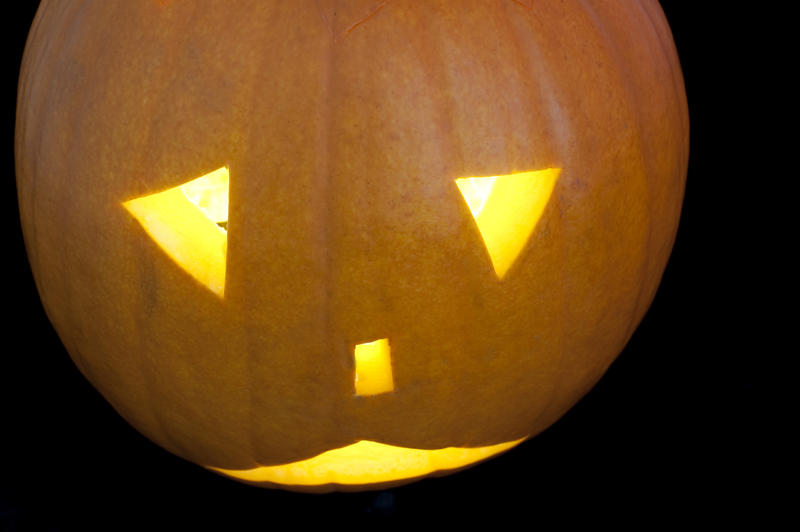It's a mask?Well, it's the one time of year where folk don't tell me I can take my mask off now...
lain:
Do Jack-o-lanterns make Brits feel self conscious or is that just a vicious rumor I keep spreading?

It's a mask?Well, it's the one time of year where folk don't tell me I can take my mask off now...
lain:

It would only make AB feel self conscious if it was wearing a sombrero.It's a mask?
Do Jack-o-lanterns make Brits feel self conscious?

- The celebration of Samhain was a tradition limited to the Northern Celtic regions (particularly Ireland and Scotland). By the time that All Saints’ Day came to be associated with November 1, Christianity had been well-established in this region for at least 300 years. There is no indication that ancient pagan practices persisted on Samhain in a way that concerned Christian leaders.
- Even if remnants of pagan practices remained in the remote parts of Christian lands (the Northern Celtic regions), they were probably not of particular concern to the Christian leadership in Rome (which was 1500 miles away across land and sea).
- It is quite possible that November 1 was chosen so that the many pilgrims who traveled to Rome to commemorate the saints “could be fed more easily after the harvest than in the spring.”
- Irish Christians originally celebrated the saints on April 20. So before the establishment of All Saints’ Day, it is more likely that they remembered their dead in April than during Samhain. Furthermore, there is no concrete evidence to suggest that Samhain had any association with the dead.
- The idea that Samhain was a festival of the dead was popularized by Sir James Frazer in his famous work The Golden Bough, A Study in Magic and Religion (1890). However, Frazer seems to have confused the traditions associated with All Souls’ Day (Nov. 2) with ancient Samhain practices. It is more likely that the Christian holiday of All Saints’ Day (as well as All Souls’ Day, which will be described in the next section) introduced a focus on the dead to Samhain rather than the reverse.
Halloween...looks like some of the kids smeared your license plate.View attachment 20387
View attachment 20388
[Click pixs to enlarge]
Other than that, I have no opinion about Halloween. :AMR:
You're like a photo savant or somethin.the one is your profile picture
Halloween appears innocent. But it it's origins are very dark. From the RC Church.
traddling the line between fall and winter, plenty and paucity, life and death, Halloween is a time of celebration and superstition. It is thought to have originated with the ancient Celtic festival of Samhain, when people would light bonfires and wear costumes to ward off roaming ghosts.
yes, halloween appears Innocent, giving candies to children dressed in cute costumes. But lets consider what we are conditioning children for. There future. A dark season or a season of light in Christ ?
View attachment 20387
View attachment 20388
[Click pixs to enlarge]
Other than that, I have no opinion about Halloween. :AMR:
AMR
It would only make AB feel self conscious if it was wearing a sombrero.
It's a mask?
Do Jack-o-lanterns make Brits feel self conscious or is that just a vicious rumor I keep spreading?
hallweeny is Devil Worship personified.
I wonder if wearing a sombrero has some deep dark beginnings attached to it?
I'll say this. If kids can't enjoy Halloween, Christmas and the Easter bunny....to say nothing of celebrating birthdays, they will end up resenting their parents' religion. So, let them wear sombreros if they want. :thumb:
Did someone go as a clock?When you hit high school, it's time to ditch the costume
SWAT team descends on CO school over student’s Halloween costume
Do you mean that you have difficulty with buttons or that you wear the wrong sort of costume?I can't stand Halloween. I like going to parties, but I hate dressing up in a costume like a child.
I can't wait to hear about your Christmas.Also, trick-or-treat happens on my birthday, so I flee the house and go out for margaritas while hundreds of little gobblins troll my neighborhood for candy.
Do you mean that you have difficulty with buttons or that you wear the wrong sort of costume?
I can't wait to hear about your Christmas.lain:

It would only make AB feel self conscious if it was wearing a sombrero.

It would only make AB feel self conscious if it was wearing a sombrero.
